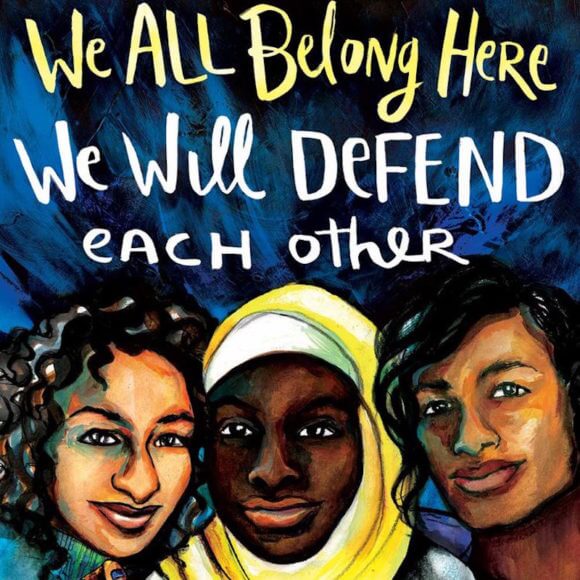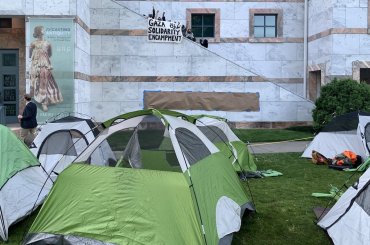If Trump’s first week as president exceeded our worst fears, his second week confirmed that we are truly in a state of emergency. And it’s fast getting worse. And we need to stop it.
Trump’s election does not represent an uncharted mutation of U.S. history, but rather a continuation of the path this country has been on since it was first founded. Indigenous people (and a few non-indigenous allies) have rightly pointed out that statements such as “First they came for the Muslims” are erasing the fact that first they had come for the Algonquin. Indeed, even before issuing the Muslim Ban, Trump had signed an order allowing the continuation of the Dakota Access Pipeline, which directly violates indigenous rights.
Similarly, before they came for the Muslims, they had come and continue to come for Africans and African Americans. And all along, we have been letting it happen.
We have enabled this presidency because we have not been serious about shutting down these historic wrongs any earlier. When we went about our daily business even though we knew Obama was bombing weddings in Pakistan and Afghanistan, we enabled Trump’s presidency. When we continued to pay taxes even though one president after another sent billions of our dollars to Israel, we enabled Trump’s presidency. When we kept blaming “the Republicans” for what just about every one of our leaders, Republican and Democrat, went along with, we enabled Trump’s presidency.
Sure, we protested, but Trump’s presidency should teach us one thing: we have done it wrong so far. The fire drill we have been practicing has never put out any fires, and we must do it differently.
But we have also secured some real victories of late, which confirm to us that when we do it differently, we win. When we organize, and mobilize, and are determined to do whatever it takes to shut it down, then we can shut it down.
Over the past two weeks, we have secured two significant victories, one national, the other local.
The first was at the airports, when Trump announced the Muslim Ban even as some people who would be impacted were onboard planes coming to the US. The mobilization that happened was fast, and effective. Organizers, activists, and tens of thousands of “protesters” descended on the airports, not just denouncing the executive order, but taking direct action to resist it. Lawyers confronted Customs and Border Patrol officers, challenging them, speaking truth to power as they informed them that they were carrying out an illegal order. Eventually, all the detainees were released at airports in San Francisco, Chicago, New York, Virginia, Seattle, Los Angeles, Washington DC. The protesters did not hold rallies downtown, they went to the airports, and disrupted the implementation of Trump’s ban where it was being carried out.
While the response to that executive order was swift, it was not spontaneous, but came out of years, decades, of community organizing, grounded in the knowledge that “the system” is not set up to protect us, but that we must be vigilant and rely on each other, on our communities, and our allies, for our own protection. And to be able to rely on these networks, we must have cultivated them diligently, carefully, lovingly. And as our circumstances get even harsher, we must realize that we already have what it takes to win, so long as we stick together. We have the numbers. We are the majority. We can block the system, stop it in its tracks. We are the leaders we need. We, black and brown, gay, poor, disabled, and sick, we who were never meant to survive, yet are still here.
The other significant victory was the shutting down of the scheduled Milo Yiannopolous talk at the University of California in Berkeley. Anyone who would blame the protestors for “violence,” rather than resistance, is assuming that the promotion of hatred is non-violence. But that assumption, quite simply, is wrong. There is no such thing as “non-violent hate speech.” Hate speech has direct consequences, all of which are violent. In October of last year, blogger Jonny Silvercloud asked “Why Isn’t Anyone Talking about White Radicalization?” and concluded his post with the warning that unless white radicalization is stopped, fascism is next. Preventing Yiannopolous from speaking at Berkeley was direct action to shut down fascism.
That victory, the forced cancellation of a hate speech event, is needed confirmation that we cannot expect “the system” to protect us, but that we can protect ourselves. At the University of Washington, where Yiannopolous had spoken the previous week, students had approached the administration to cancel the event. The administration’s response was that they would only do so if there is “clear and present danger.” For the danger to be “present,” however, the talk must be in session. The university, the “system,” would not recognize that hate speech is always incitement to violence. Eventually, there was indeed violence, as one of the fans of the speaker shot an unarmed medic, who was de-escalating the situation. And the shooter, Marc Hokoana, an alt-right devotee of Yiannopoulos, was let go, on the basis of self-defense. Hokoana had come armed to a gun-free campus, and shot a medic, yet the university’s response was that the protesters had instigated the violence, and Hokoana was acting in self-defense.
These are the lessons and victories we need to learn from. They show us how little happens when all we do is “protest,” and what we can accomplish when we mobilize, and are determined to resist and engage in direct action until the system is stopped in its tracks.
I don’t want to minimize the importance of protests. Protests are useful, in that they tell us we are not alone. The visibility of dissent invigorates and inspires us. And as we are being swamped, suffocated, shell-shocked by executive orders and their consequences coming fast and furious at our battered communities, protests are a welcome salve. But protests should not be about “having our say,” protests should be about stopping what we object to. And words, writing, educating, organizing, are a start. But they must be followed by non-cooperation, disruption, direct action. There is a long-standing system in place that will go on, with or without us, simply through inertia. What allows it to go on is not only people looking away, it is also people believing that if they take to the streets, then go back to business as usual, they’ve done enough.
Taking to the streets is not enough. We must organize, resist, and SHUT IT DOWN.
Never again is now.



« “First they came for the Muslims” are erasing the fact that first they had come for the Algonquin. Indeed, even before issuing the Muslim Ban, Trump had signed an order allowing the continuation of the Dakota Access Pipeline, which directly violates indigenous rights. »
If it’s about at the same time the British were colonizing the Kanada territory, the Natives, our First Nations as they’re called in Canada, were also losing their territory by force to a certain extent. Today, centuries later, they’re still in reserves in Canada. Only one government so far has made deals with one of its First Nations in what is called « La Paix des Braves » (The Peace of the Braves), and was under Québec’s Parti québécois sovereignty government, with the Cree Nation:
https://en.wikipedia.org/wiki/Agreement_Respecting_a_New_Relationship_Between_the_Cree_Nation_and_the_Government_of_Quebec
Salon has an interesting article on what drives Trump.
read more at
“Trump brings more to the presidency than just a total lack of experience in international relations, failure to understand world history and an openly bigoted worldview: Mental health experts are warning that he displays signs consistent with those of a “malignant narcissist.”
http://www.salon.com/2017/02/04/the-end-of-the-world-as-we-know-it-the-donald-trump-white-house-is-set-to-destroy-decades-of-u-s-foreign-policy/
“Trump has also shown no ability to understand why the United States invests in its allies. His constant calls to have allies “pay their fair share” fails to recognize the benefits of strong multilateral alliances. According to Chatham House, these actions “will leave . . . America’s partners . . . uncertain about US reliability.”
Chatham House also argued that Trump is best understood as a nationalist rather than an isolationist: “He is not proposing US withdrawal from the world per se, but he has a narrower interpretation of vital American interests than his predecessors did and will likely assess international engagements in more transactional terms.”
This means that the United States will only invest in international organizations, alliances and partnerships if Trump can see a direct benefit. Such a move threatens the very nature of a system of allies, since the parties support one another to protect the relationship and not only out of self-interest. This is a concept Trump apparently can’t grasp.
The third core takeaway of Chatham House was that Trump’s foreign policy favors economic benefits over security, human rights and other longstanding issues at the core of our diplomacy. Under Trump the United States may be even more willing than ever to overlook human rights abuses or invasions into sovereign territory if there is economic advantage for America (or perhaps even for Trump himself).
Chatham House argued that the move from security to “a mercantilist agenda with little appreciation for longer-term geopolitical dynamics or the continuity of the US’s relationships with key partners would mark a pivotal change, with potentially profound negative implications for international stability.”
And lastly, even before Trump had taken to Twitter to insult Australia, Mexico and Iran, Chatham House keyed into his mercurial personality: “Trump’s personality and style — brash, unpredictable, contradictory and thin-skinned — promises to have a meaningful impact on his engagement in foreign affairs.”
Thus the transactional nature of foreign policy under Trump can’t be solely described by the fact that we have a businessman in the White House and another one, Rex Tillerson, soon to be running the State Department. While a businessman might not be able to fully grasp the benefits of cultivating international alliances and forging a balance of power, he or she does understand that completely upending the world system is bad for business.” Salon
RE: “Taking to the streets is not enough. We must organize, resist, and SHUT IT DOWN.” ~ Nada Elia
#NotNormal
RESIST ! ! !
• To order “RESIST” bumper strips – http://www.commondreams.org/resist
I think Trump is incompetent. Kellyanne Conway will not be taken seriously or even invited for interview. Bannon is deluded.
The judicial branch will not roll over. And there is a 3 way split in the GOP viz ideologues, Breitbarters and humans. Trump has the potential to destroy the GOP.
Anyone can lie to Evangelicals but the educated half of the US is a much harder sell. Trump is a Potemkin effort by the 1%. And will emulate Humpty Trumpty Dumpty
Who is this “we”? All citizens of the world? Give me a break. This is the kind of looniness which does nothing to further the cause for Palestinian self determination. Nations have the right to meaningful borders. Our people have the right to decide which cultures are invited. It is that simple.